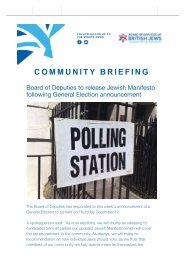2019_bbm_winter_print copy
You also want an ePaper? Increase the reach of your titles
YUMPU automatically turns print PDFs into web optimized ePapers that Google loves.
However, Suzi, who has been here for much less time, is
still struggling.
When she had a toothache, she asked A.Y. to take her to
someone “to get it cut out with a knife.”
In South Sudan, he explained, they extract the tooth and
wash the mouth with salt water. There is no modern dentistry.
When her young son was in the hospital with malaria,
he had never slept in a crib. She had to convince the hospital
staff to put a mattress on the floor so he could rest.
And recently, she went to the supermarket and offered to
pay for 500 shekels worth of groceries with five 200-shekel
bills and could not understand why the cashier insisted on
giving her change.
“She never learned basic math,” A.Y. said. She does not
know how to read and write, something she hopes to change at
the absorption center.
The sisters dream of eventually opening up a hair salon
called “African Sisters,” catering to Ethiopian and other African
immigrants like themselves.
“At the end of the day, when the people of Israel say,
‘Welcome home,’ they mean it,” A.Y. said. “My sisters
are home.”
B'’nai B'’rith Assisted in
Jewish Ethiopian Exodus
By Cheryl Kempler
In 1905, Polish anthropologist Jacques Faitlovitch,
from the Sorbonne, first traveled to Abyssinia (now
part of Ethiopia) to study its devout community of
men and women who identified as Jews.
He became the first person to spread awareness of the
Falasha Mura (“aliens,” their former name) or Beta Israel.
Israel officially recognized them as Jews in 1975, but Ethiopia’s
anti-Zionist policies prohibited them from emigrating.
Learning that some of their people had gone to Israel
from neighboring Sudan, where the Israeli government
had rescued them, thousands more suffered in its squalid
refugee camps, where they lost hope of making Aliyah.
At Israel’s request, B’nai B’rith’s then president, Gerald
Kraft, traveled to Ethiopia to assure its Jewish community
that Israel would fly the Ethiopian Jews out. His organization’s
seven-branched menorah was strong proof for
a people with sacred and secular traditions measured by
that number: Even the Sabbath is grouped into cycles of
seven. After the Ethiopian government curtailed “Operation
Moses” before all the Jews were extricated, Kraft met
with French President François Mitterrand and U.S. Vice
President George H.W. Bush, whose administration had
already planned to complete the airlift.
The approximately 8,000 Ethiopian Jews arriving
between November 1984 and March 1985 were assisted
in resettlement by B’nai B’rith, coordinating with Israel’s
government and clergy.
Israeli and overseas districts were among the philanthropies
meeting the immigrants’ needs; British and Australian
B’nai B’rith lodges constructed community centers and
club houses and ran vocational programs. From a member’s
significant gifts, Netanya’s David Ben Gurion Lodge
established a foundation that paid for camp tuition and
college scholarships.
Anticipating “Operation Solomon,” which rescued
approximately 14,000 Ethiopian Jews over a few days in
1991, lodges readied clothes, diapers, medicine and furniture.
B’nai B’rith’s volunteer department and District 14
(now B’nai B’rith Israel) developed an initiative relying on
help from members and others who oriented the newcomers
to modern life. “Adopt a Family” matched donors to
individual households, who received letters and packages.
During the mid-1990s, B’nai B’rith focused on Ethiopian
children who were integrating into Israeli society.
District 14 funded hundreds of bar mitzvah celebrations,
and a Los Angeles lodge, Ivan Franks-Ladra, donated
$5,000 to raise educational standards at a pre-school
based at an immigrant trailer park. During the years in
which the Ethiopian Jews were adjusting and needed
assistance, B’nai B’rith continued to provide their families
with, among other things, eyeglasses, dental care and, for
students, sports equipment and book bags.
B’NAI B’RITH 19
















